Cheryl Angel, Sicangu Lakota Water and Land Protector, community activist and great-grandmother, was the first person in the lineup for Earth Sky Woman Tami Brunk’s EcoSapien Speaker Series. Because we never had a chance to delve deep into those wonderful interviews, we are going to be sharing some very special ones with you this year, beginning with Cheryl — in part because the sacred Black Hills, of which she spoke in this interview, are the subject of an upcoming investigative piece by Lakota Country Correspondent Talli Nauman, and so with this interview, we are laying the groundwork. We share some edited excerpts of this July 2022 interview here.
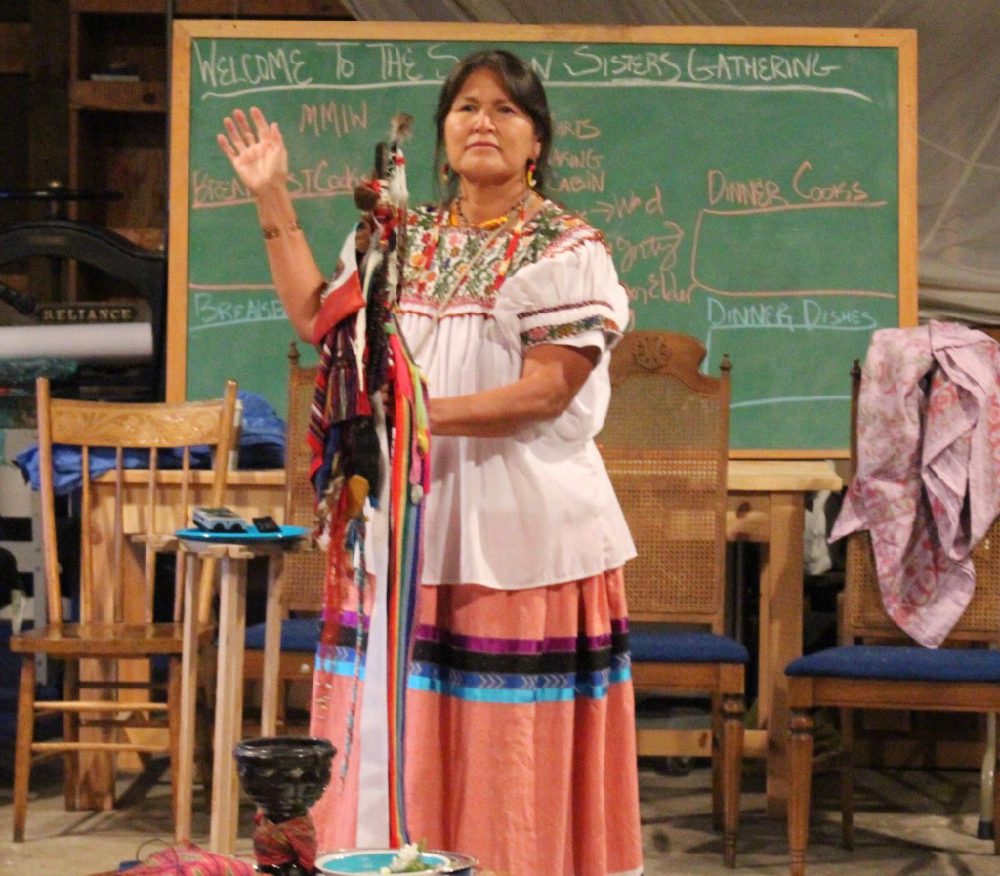
Cheryl: “It gives me a good feeling in my heart to know that people are here in attendance because there’s a lot of work to be done, there are a lot of alliances to be made and without those alliances and without people committed to do the work, our landscape and our environment and our world is going to continue to not be sustainable. And so every effort that people make to protect their watersheds, to return lands to the original caretakers, or to allow them or give them or restore the rights of nature, would solve so much.
If the rights of nature were restored, and whoever the landowners were, if they committed to those rights and they understood those rights and they built a relationship with the land that they’re standing on, the land would be telling them what to do. The land would be supporting them, in a really holistic manner. It would perform better because it would be a relationship, and it sort of follows the same philosophy when people say “talk to your plants because they hear you and they respond to you”. So does the land, and so do the plants on that land, and so does the water that runs through that land and nurtures it. That’s what being connected really means, is being able to understand that message that the land and the water and the plants and the animals are actually saying, because they have been endangered longer than we have; as a matter of fact, we put our own existence ahead of their safety and their needs and their habitats.
And so many species on the planet are dying now because of that philosophy that humanity comes first. Our needs come first. That’s not how the planet runs, that’s not how the Earth lives. The Earth was a Paradise for animals and plants until we came. This planet was already inhabited and had nations.”
Para leer esta historia en Español ir a Cheryl Angel habla sobre la defensa de nuestras cuencas hidrográficas y el corazón de todo lo que existe.
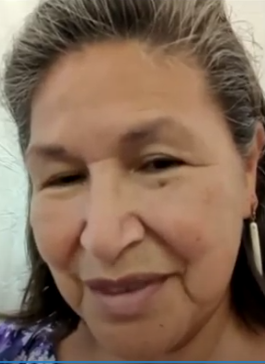
“We recognize the Lakota people and other tribal people. If you look at the oldest relics, what people call antiquities, you’ll see (images of) pumas, black panthers, leopards, buffalos, birds, snakes, butterflies. You’ll see whales, dolphins, you’ll see effigies of spiders, Because those are the oldest memories in this world. They hold older memories than we do. And I think it’s really important that we look at the world and we treat the world from that perspective.
And we can make that change when we change our perspective of how we look at the world, how we live with the world, how we communicate with the world. And it’s not too late.”
“Right now in Colorado, the Colorado River is endangered. Right now here in the Black Hills, Rapid Creek is one of the ten most endangered creeks or rivers in the United States.
I want to encourage everybody, wherever you live, you have a watershed that’s alive and needs your help. Wherever you live, there are landscapes that are endangered, where their rights are not exercised.
Maybe your watershed and your river is endangered. Maybe your creek has run dry. But there are things that you can do. So those are the things that I want to encourage you: to being committed to living in harmony. That’s the first start. Having a relationship with the land that you walk on is a start. Talking to people who took care of that land before it was colonized is a start. Understanding that comfort is keeping you from looking at the reality that’s happening all around you.”
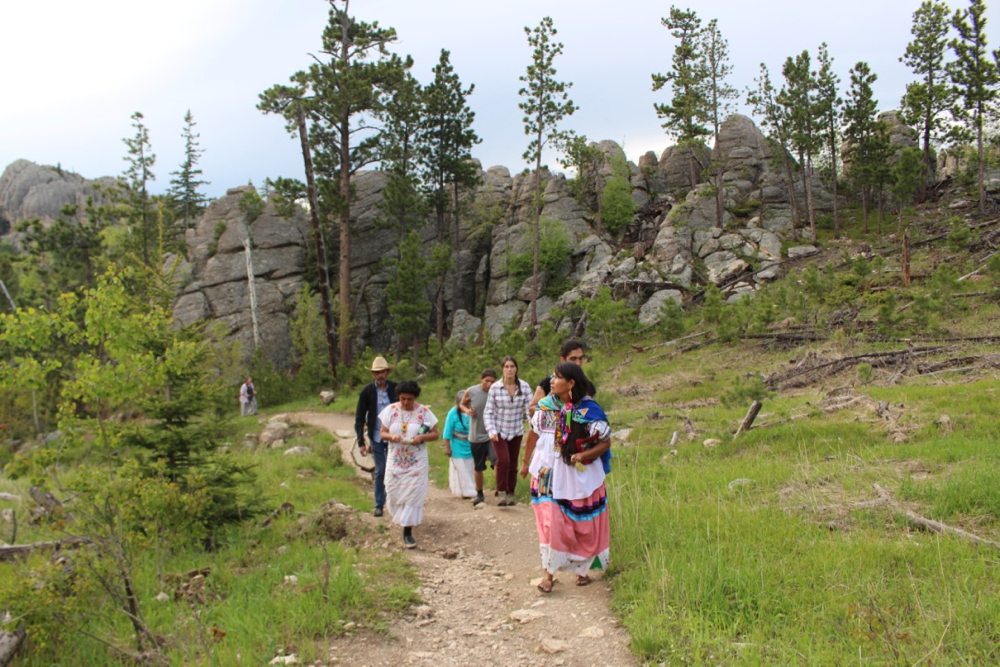
Black Hills under attack
As Talli’s story details, the situation in the Black Hills has evolved since this 2022 interview. Because of the hard work of people in the Black Hills Clean Water Alliance like Cheryl – and in dozens of other grassroots organizations –, a flood of public comments compelled the USDA Forest Service to propose a moratorium on mining in the area, an unheard-of response from an agency long-since captured by the mining industry. Stay tuned for that story, to be published later this week, and for an opportunity to comment on the Forest Service’ final recommendation to the Bureau of Land Management.
Cheryl – “Right here in the Black Hills, gold mining permits – they call them exploratory permits – have been approved. And that’s the reason why I’m so worried. I hurt, literally. And, I’m so afraid that the watershed of the Rapid Creek is going to be damaged and contaminated, it’s going to be harmed.
And so when people ask me about the Black Hills, I say it’s under attack. The water is under attack. The Black Hills have been under attack because people are doing things that you wouldn’t do to a human being. If you had one beautiful being that sustained all of us, you would recognize that being as untouchable. And that’s how we view the Black Hills. As a sacred area and untouchable area, something that’s revered because we understand the power and the value of life. The light that it created here on this continent.
And to have things like exploratory boring – they bore 1,000 feet down. That’s what they call exploratory. They have core samples, and they bore into the ground 1,000 feet, and they don’t do it once. They do it a couple hundred times, in different areas all the way around Rapid Creek. So if you look on Black Hills Clean Water Alliance, you’ll see we provided maps to show you how many mining companies are located in the Heart of Everything That Is.
And you’ll see the words that we use to explain what’s happening. Because it’s not easy to convince people to stand up and say “what you’re doing is wrong.”
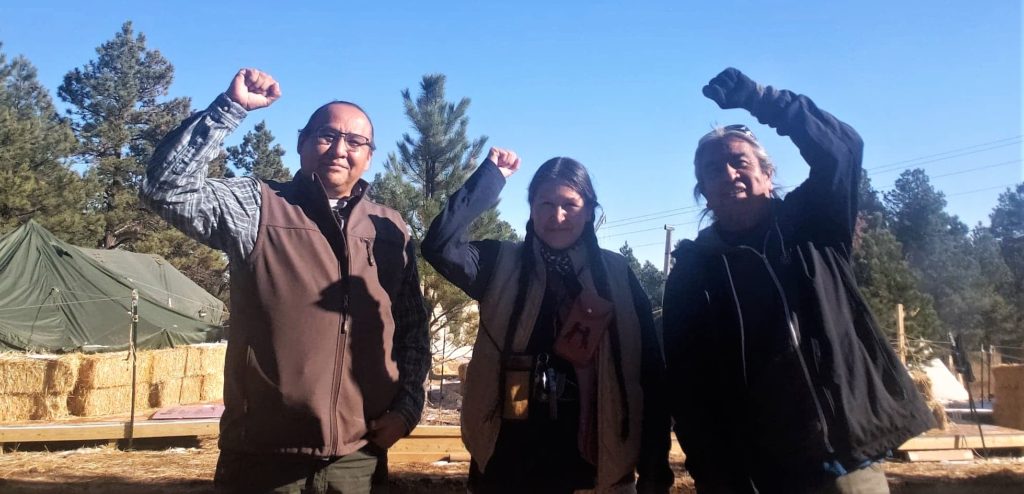
“Go to the Black Hills Clean Water Alliance. I’m one of the recent board members. Yesterday we had a water action. We took a pontoon boat onto Lake Pactola, because that’s the lake that provides all the water to Rapid City. And the exploration permits surround Lake Pactola and they’re actually less than a mile from it. And you know, water runs downhill, and they need water to do gold mining. And the process that they use kills the water.
Contamination is going into Lake Pactola every time it rains, because it’s surrounded, it’s like the bottom of a horseshoe. Everything runs downhill. It’s going to go right into Lake Pactola. So it doesn’t make any sense for the Forest Service to be handing out permits that are going to contaminate the only water source that flows into the Rapid City area.
And it’s also a tourist town. Everything is about tourism. It’s about the beauty. It’s about fishing, it’s about swimming. It’s about boating. And without water here, with contaminated water, people won’t be able to eat the fish anymore. Won’t be able to get into the water anymore. And worst of all, the animals and the people won’t be able to drink water. The plants won’t grow.
But if it was a child, and someone said, your child’s super, super special. And they’ve got things that we want and we’re going to explore the heart of your child, and we’re going to take core samples out of the heart of your child, and then we’re going to value all of those minerals, and then we’re going to sell them.”
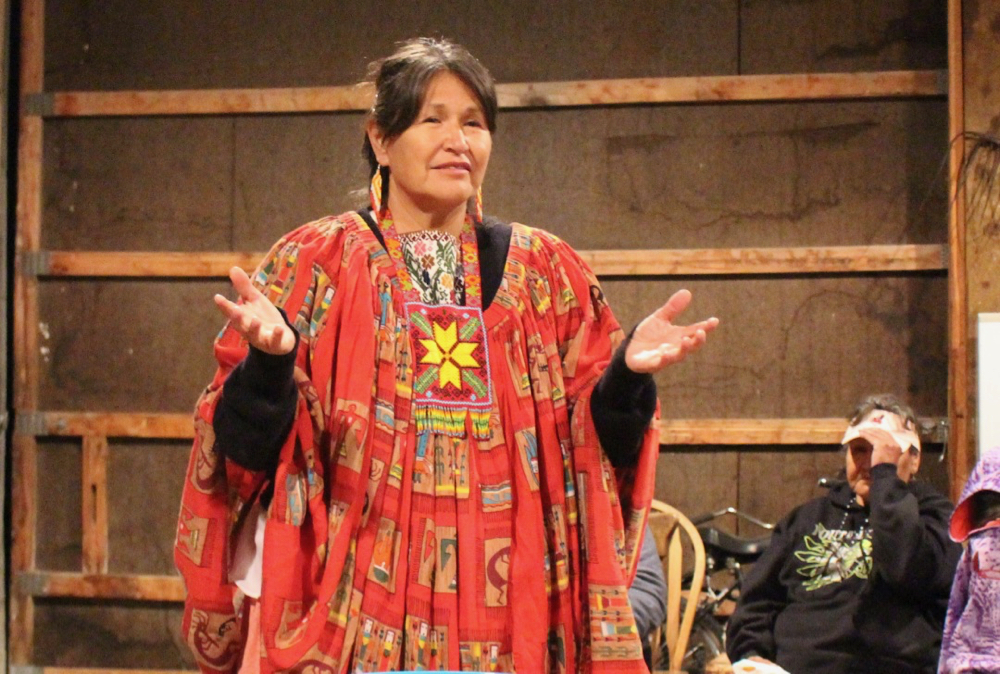
If you listen to native people all around the world, there are people from Colombia, there are people from South America, there are people from Central America, who still have the stories of what their lands are called, and the names that they held since time immemorial. I believe that they were chosen to share with all the descendants so they know what that land is called, and how they came to be and what their purpose was, and how to communicate with the animals, how to communicate with the land and live on the land and listen to the land.
Those are the things I hope will change people’s hearts, that will bring them an understanding so that they can be a better relative to the Earth, to the animals and to the plants. Because they were the chosen ones. They were put here to exist on this planet. And we humans, we’re actually just passing through. We’re not going to be here very long. And yet the philosophy of consumerism and capitalism has made us think that we can take whatever we want while we’re here without giving back. And not only can we take it, we can place a value on it and then we can sell it.
This planet wasn’t made to be sold. This planet was made to sustain us for the times of our life that we’re passing through. And it’s beautiful and it can do that. If we just remember we’re passing through and everything that we touch, our grandchildren are going to touch. Everything we eat and grow should be there when our grandchildren come and when their grandchildren come. But we change the landscape so much. The rivers are drying up. And we’ve taken so much that our resources are being depleted.
This Earth, it’s not a machine. It’s a living entity. Nature has rights. We need to listen and follow and enforce those rights, in our communities, in our townships, in our state, and even in our Constitution. Because that’s where all the power lies today, in the governance that we follow here in America and in other countries.
Constitutions can protect the rights of nature. So there’s a lot of work to be done. First, we’ve got to stop this extraction that’s going on because resources are finite. But this planet was meant to live forever. We could enjoy eating an apple, sitting under a banana tree, watching a butterfly, swimming with the dolphins. Those are the things that we’re going to lose, that our grandchildren may not see, if we don’t start taking care of the planet like a relative, and understanding and learning what that is and how we can change.